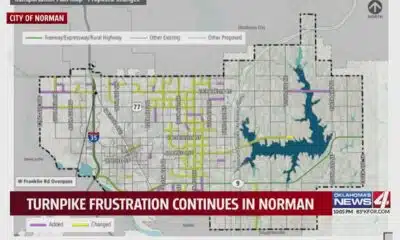News from the South - Arkansas News Feed
REAL ID requirements among policies difficult for transgender, nonbinary Arkansans to navigate
by Tess Vrbin, Arkansas Advocate
April 30, 2025
Gender-nonconforming Arkansans might not meet the state’s requirements to obtain a REAL ID in order to board flights or enter certain federal buildings, which is a week away from being required by federal law.
Applicants for REAL IDs need to provide the Department of Finance and Administration with four different forms of identification:
A current driver’s license, state-issued ID, or school or work ID as proof of identityA passport or birth certificate as proof of legal presence in the United StatesA government-issued social security cardTwo documents providing proof of address, such as utility bills or bank statements, issued within the last six months
The documents “all have to sync up,” Finance Secretary Jim Hudson said last week.
Transgender and nonbinary Arkansans might have changed their names or gender information on some but not all legal documents, and state policies have made it difficult for these groups of people to obtain documents that accurately reflect who they are, advocates say. Birth certificates can be legally altered, and until this year, the federal government allowed gender-neutral information on U.S. passports.
“The government has played politics with people’s lives and upended people’s ability to accurately and properly identify themselves,” said Holly Dickson, executive director of the American Civil Liberties Union of Arkansas. “This has created much chaos and turmoil for no good reason while making life harder and more unsafe for all of us.”
Last year, the ACLU of Arkansas led a lawsuit against the DFA’s decision to stop issuing gender-neutral driver’s licenses. The case was dropped after Arkansas officials permanently adopted the new policy, which prohibits the use of an “X” to indicate someone’s gender in place of “M” or “F.”
Arkansans urge state finance department not to reverse gender-neutral driver’s license policy
Several transgender and nonbinary Arkansans, including Maggs Gallup of Little Rock, urged the finance department to maintain the previous policy, which had been in place for 14 years. Gallup said in an interview Monday that they are putting off obtaining a REAL ID in case doing so requires the state to remove the X gender marker from their driver’s license.
Hudson told lawmakers that a driver’s license is “not a platform for speech” and “not a platform for personal identity.” Gallup disagreed, saying their gender-neutral ID is important to them and putting incorrect information on an ID is “a deeply incongruent thing to do.”
“In an ideal world, it would be great to have the state and officials recognize our gender,” Gallup said. “They don’t get to determine who we are, no matter what letters we put on our IDs.”
REAL IDs began with a law passed by Congress in 2005 as a response to the Sept. 11, 2001, terrorist attacks. Instituting REAL IDs statewide “will help fight terrorism and reduce identity fraud,” according to the finance department website.
The federal Transportation Security Administration accepts passports in place of REAL IDs as identification to board a flight. Miss Major Griffin-Gracy, a well-known transgender advocate who lives in Little Rock, said last week on Facebook that she was initially denied access to a flight because she has an X on her driver’s license, but she was allowed to board after displaying her passport containing a male gender marker.
Griffin-Gracy is 78 years old and gender-nonconforming, and she was present at the 1969 Stonewall riot between LGBTQ+ people and police in New York City. In her Facebook video, she expressed disbelief that her passport was accepted even though she did not appear masculine. She also said “we the people” should “stand up and fight” President Donald Trump’s administration, which does not recognize gender-neutral IDs.
Gallup said they are also concerned about potential limits on travel, both domestic and international, with or without a REAL ID. Their teenage child is old enough to learn to drive but is putting off obtaining a learner’s permit because of potential bureaucratic obstacles due to their gender-nonconforming identity, Gallup said.
Bill regulating transgender Arkansans’ bathroom use heads to House despite public pushback
“This is just one part of a larger, really complicated network of new rules and legislation that are challenging to navigate” for transgender and nonbinary Arkansans, Gallup said.
State lawmakers and Gov. Sarah Huckabee Sanders approved a law this month that will allow Arkansans to sue for damages if they encounter someone in a bathroom, changing room, shelter or correctional facility who does not align with the “designated sex” of the space.
The state has also enacted laws in the past few years that ban transgender girls from playing girls’ sports, require public school students to use bathrooms that match their gender assigned at birth, regulate pronoun use in schools and allow doctors who provide transgender minors’ health care to be sued for medical malpractice.
GET THE MORNING HEADLINES.
Arkansas Advocate is part of States Newsroom, a nonprofit news network supported by grants and a coalition of donors as a 501c(3) public charity. Arkansas Advocate maintains editorial independence. Contact Editor Sonny Albarado for questions: info@arkansasadvocate.com.
The post REAL ID requirements among policies difficult for transgender, nonbinary Arkansans to navigate appeared first on arkansasadvocate.com
Note: The following A.I. based commentary is not part of the original article, reproduced above, but is offered in the hopes that it will promote greater media literacy and critical thinking, by making any potential bias more visible to the reader –Staff Editor.
Political Bias Rating: Center-Left
The article appears to adopt a Center-Left perspective primarily through its focus on issues affecting transgender and nonbinary individuals, particularly with regard to identity documentation requirements in Arkansas. It emphasizes the challenges faced by gender-nonconforming individuals in obtaining accurate identification and highlights criticisms from the American Civil Liberties Union (ACLU) regarding the state’s policy changes. The language used is sympathetic toward these groups, portraying the state’s actions as creating unnecessary turmoil and being politically motivated. Although the article provides factual information about the REAL ID process and relevant legal actions, its framing leans toward advocacy for the rights of transgender individuals, positioning the state’s policies in a critical light. This reflects a broader pattern of liberal advocacy for gender inclusivity in government identification practices. However, the piece does offer direct quotes from state officials, which helps balance the presentation of opposing views. Thus, the overall tone remains more supportive of progressive policies on gender identification, hence the Center-Left categorization.
News from the South - Arkansas News Feed
Two major Central Arkansas road projects inching towards completion
SUMMARY: Two major Central Arkansas road projects are nearing completion, offering relief to long-troubled areas. At the dangerous Denny and Canis roads intersection in West Pulaski County, plans shifted from a roundabout to a signalized intersection due to a land dispute. The new design will realign traffic and convert part of Denny Road to one-way, with construction expected to start mid-July. Meanwhile, the years-long widening of I-30 in Saline County is in its final stages, with crews finishing striping and installing reflective markers. The project aims to ease congestion and improve safety, with completion expected late this summer.
Pulaski Co. officials confirm construction will begin soon at the Denny-Kanis intersection, while ARDOT says the I-30 widening in Saline County is nearing completion
News from the South - Arkansas News Feed
Centerton prepares for new FOIA law taking effect in August
SUMMARY: Starting in August, Centerton will implement Act 505, a new Arkansas law amending the Freedom of Information Act of 1967. This law requires voting members of commissions, boards, and city councils to attend public meetings in person, eliminating virtual participation. It provides clearer guidelines on what governing members can discuss privately versus what must be addressed in public forums, aiming to enhance transparency. City leaders and legal experts emphasize the law’s role in fostering trust and improving public access to information. Meetings will remain open to the public, with live broadcasts on YouTube and Zoom access also available.
A new Arkansas law taking effect in August will require local government board members to attend meetings in person and sets stricter rules to ensure transparency in public discussions.
Subscribe to 40/29 on YouTube now for more: http://bit.ly/PTElbK
Get more Northwest Arkansas news: http://www.4029tv.com
Like us: http://facebook.com/4029news
Follow us: http://twitter.com/4029news
Instagram: https://www.instagram.com/4029news/
News from the South - Arkansas News Feed
Arkansans paying millions more in tariff costs compared to 2024
by Ainsley Platt, Arkansas Advocate
July 1, 2025
Arkansans are paying millions more for daily necessities like car parts as a result of tariffs placed on imports by the Trump administration, according to a report from Farmers for Free Trade.
The national nonprofit discussed the report during a town hall meeting Tuesday in North Little Rock. According to the report, Arkansans paid $747,700 in import taxes for vehicle parts in April 2024, with an average tariff rate of 7.3%. In April 2025, that number more than tripled to $3.5 million, with the average tariff rate reaching 27.3%.
Vehicle parts are especially exposed to the tariffs instituted by President Donald Trump in response to what he has described as unfair trade practices by other countries. American car manufacturers have increasingly turned to Canada and Mexico for manufacturing parts for their vehicles in recent years, with more than half of American vehicles and parts coming from those two countries.
But the tariffs — and the back-and-forth they have created for businesses as the administration announced new levies and then backed away from them in order to negotiate — don’t only affect car parts. Arkansas also imports hand tools and air pumps and fans from other countries, and paid large tariff costs as a result.
“Arkansas companies have already experienced sharp tariff increases in March and April of this year. But the breadth of these proposed trade actions — if fully enacted — could result in even more severe cost burdens in the months ahead,” the report said.
The broader trade war also poses risk for agriculture, the state’s largest industry.
During a panel discussion at Tuesday’s town hall at Jenkins Enterprises, longtime farmer and Corning Republican Sen. Blake Johnson said he believed the tariffs could force 20-30% of U.S. farmers to close their doors by December if relief doesn’t come, even as he said that tariffs were necessary and needed “so we can sell and buy in a fair market.”
Farmers face a double-whammy from tariffs. They have high input costs for items like tractor parts and fertilizer that could increase more because of tariffs. Johnson said fertilizer that cost $450 a ton last year now costs close to $650.
Tariffs imposed by other nations in retaliation for U.S. import taxes are another risk. For example, about half of the state’s soybean exports were sent to China last year, according to the report. But after Trump levied tariffs on Chinese goods, the east Asian country imposed reciprocal tariffs on American-grown crops. Soybean exports from the U.S. to China were down 43.7% in April compared to the same time last year.
“That’s why we see the 50% fall off in Arkansas exports of soybeans, because our soybeans now are more expensive when we’re trying to sell into overseas markets [as a result of reciprocal tariffs],” said Brian Kuehl, the executive director of Farmers for Free Trade.
Trump has argued that businesses should absorb the tariff costs. Short-term pain is necessary for long-term gain, he and his allies have said, in order to bring back manufacturing jobs to the U.S.
However, Steve Jenkins, the owner of Jenkins Enterprises, which makes branded products such as Arkansas Razorbacks flags and coffee cups, said that while the administration’s goal was admirable, it was not necessarily possible.
“People will say to me, ‘Well, why don’t you just buy it in America?’ Because those products are no longer made in America, and one of the reasons for that is simply because we don’t have enough people to do it,” Jenkins said.
The issue, Jenkins said, was that even if manufacturing came back to the U.S., there wouldn’t be a workforce to fill those jobs. As America’s economy developed, he said, manufacturing of many goods was sent to Japan, then Taiwan. And as those countries’ economies developed and began focusing on more complex products, some of that manufacturing then made its way to China.
“We’ve got jobs in America, we don’t have workers…those jobs are not going to come back to America,” he said. “They’re not going to be available in America, and we just don’t have the workers to support it.”
The U.S. unemployment rate was 4.2% in May, according to the Bureau of Labor Statistics. Meanwhile, existing U.S. manufacturing has continued to contract, according to the Institute for Supply Management. Respondents to its June survey said broad uncertainty as a result of the tariffs has impacted their orders.
YOU MAKE OUR WORK POSSIBLE.
Arkansas Advocate is part of States Newsroom, a nonprofit news network supported by grants and a coalition of donors as a 501c(3) public charity. Arkansas Advocate maintains editorial independence. Contact Editor Sonny Albarado for questions: info@arkansasadvocate.com.
The post Arkansans paying millions more in tariff costs compared to 2024 appeared first on arkansasadvocate.com
Note: The following A.I. based commentary is not part of the original article, reproduced above, but is offered in the hopes that it will promote greater media literacy and critical thinking, by making any potential bias more visible to the reader –Staff Editor.
Political Bias Rating: Centrist
This article presents a balanced view of the impact of tariffs imposed during the Trump administration, reporting both the intended goals and the economic consequences. It includes perspectives from business owners, economists, farmers, and a Republican state senator, highlighting concerns about increased costs and retaliatory tariffs while acknowledging the rationale behind the trade policies. The tone remains factual and neutral, avoiding partisan language or ideological framing. The coverage focuses on the practical effects on Arkansas industries and does not overtly advocate for or against the tariffs, resulting in an overall centrist stance.
-
Mississippi Today6 days ago
Defendant in auditor’s ‘second largest’ embezzlement case in history goes free
-
News from the South - Georgia News Feed5 days ago
Are you addicted to ‘fridge cigarettes’? Here’s what the Gen Z term means
-
The Conversation6 days ago
Toxic algae blooms are lasting longer than before in Lake Erie − why that’s a worry for people and pets
-
News from the South - Tennessee News Feed6 days ago
5 teen boys caught on video using two stolen cars during crash-and-grab at Memphis gas station
-
Local News6 days ago
St. Martin trio becomes the first females in Mississippi to sign Flag Football Scholarships
-
Local News6 days ago
Mississippi Power shares resources and tips for lowering energy bill in the summer
-
News from the South - Kentucky News Feed7 days ago
Error that caused Medicaid denials has been corrected, says cabinet in response to auditor letter
-
News from the South - Georgia News Feed7 days ago
GOP mega-bill stuck in US Senate as disputes grow over hospitals and more










































